Three sessions of RI GDDF & AF Sharing held on 23, 25-Aug and 15-Sept by the Hong Kong Joint Council for People with Disabilities via Zoom. There are 21 projects from around the globe funded by the Rehabilitation International (RI) presenting throughout the 3 sessions to share their experience in executing in 6 different themes.
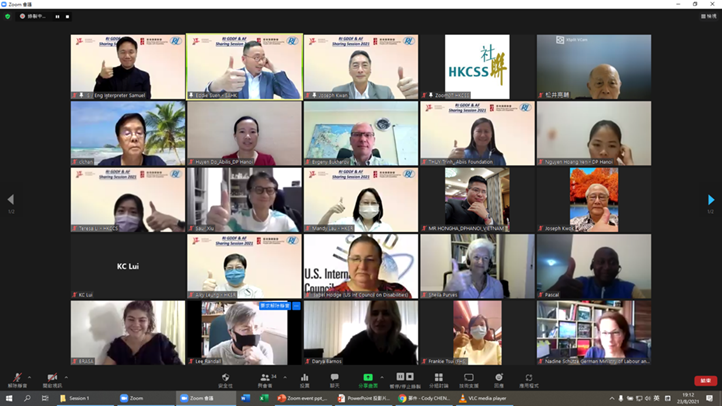
All sessions generate discussions and brainstorming with 60 participants in total around the world, such as Cambodia, Norway, Uganda, sharing the experience and use of funding, for example building accessible places and building hostels for SEN etc.
Three sessions of RI GDDF & AF Sharing held on 23, 25-Aug and 15-Sept by the Hong Kong Joint Council for People with Disabilities via Zoom. There are 21 projects from around the globe funded by the Rehabilitation International (RI) presenting throughout the 3 sessions to share their experience in executing in 6 different themes.
All sessions generate discussions and brainstorming with 60 participants in total around the world, such as Cambodia, Norway, Uganda, sharing the experience and use of funding, for example building accessible places and building hostels for SEN etc.
“Contribute to the protection of students with disabilities in Lebanon from COVID-19 through Mask provision” – funded by the Rehabilitation International Global Disability Development Fund
Background:
The COVID-19 pandemic started its rapid spread in Lebanon in 2020 and became top challenging for the government to control and relieve the increasing stress on the health system. Several lockdowns were announced trying to stop it or slow down its spreading in order to keep things under control. Lebanon already has enough economic, social, and political issues that were already stressing the citizens and were the spark to the revolution which was launched in October 2019 due to the deteriorating situation hoping for a change.
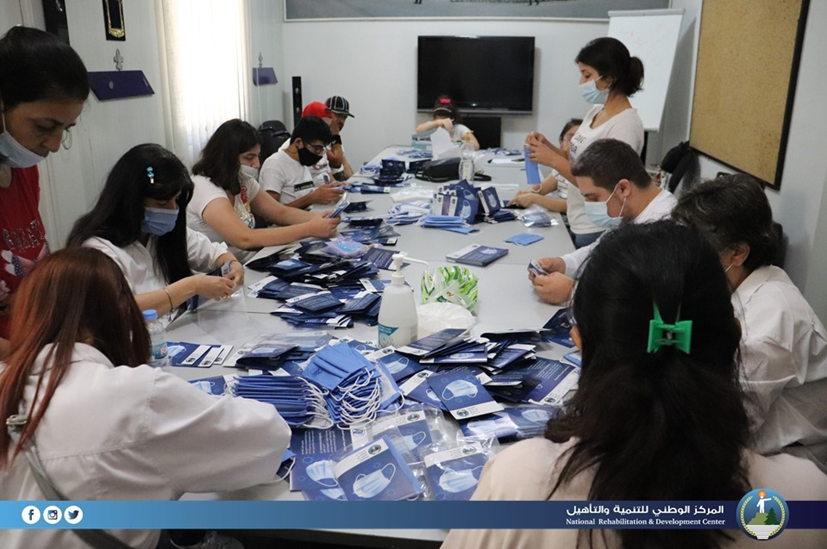
The pandemic had clearly affected people with disabilities (PWD) as the most vulnerable part of the community due to the nature of their disabilities, access to information, and other social factors. The families, in general, can’t afford to pay for the hygiene products needed for all the family members, this will push families unfortunately to prioritize their children and leave the PWD behind.
Education is one of the areas that was directly impacted by the pandemic where all the students couldn’t attend schools or rehabilitation centers and all the learning was done remotely.
Once the government opens schools to start hybrid learning or a full week of learning the PWD will start going back to the schools, centers, or NGOs to resume their education and rehabilitation process. Here comes the importance of providing masks to the beneficiaries in order to protect them from the virus. As the government has limited resources to distribute masks to all students and the discriminatory practice, students with disabilities will potentially be left behind in accessing the masks. This project is designed to ensure students with disabilities in the country get the facemasks to protect themselves from COVID-19 as they return to the centers that look after them.
This project has two main objectives:
- Raise awareness on the use of COVID-19 protection mechanisms
- Distribute facemasks to students with disabilities and protect them from the spread of COVID-19 virus.
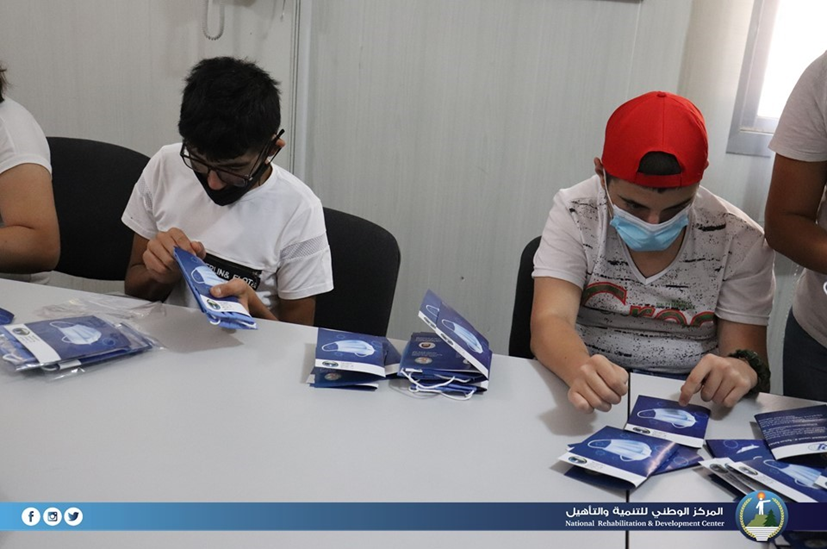
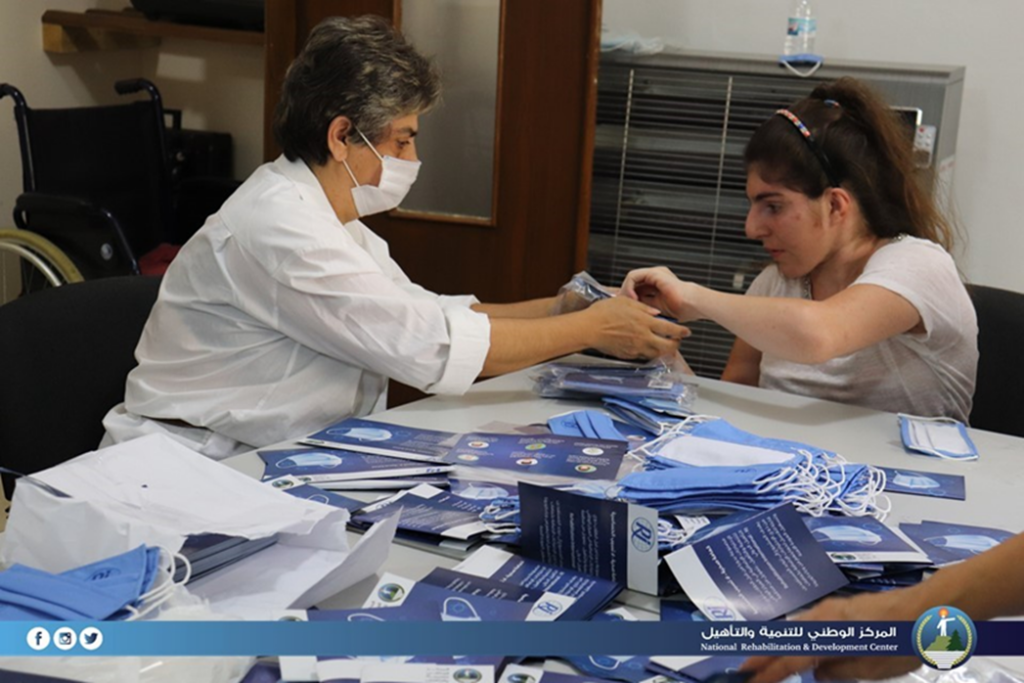
Implementation:
The National Rehabilitation and Development Center (NRDC) contracted an expert local supplier to purchase facemasks and distribute them to students with disabilities all over the country. This supplier is already our partner in vocational training where the beneficiaries are integrated at its workshop to produce medical face masks and customized PPEs for local healthcare units. All the workers had already a capacity-building session to know how to cooperate and work together with PWD.
The beneficiaries were working at the workshop with the workers and were part of all the production lines in order to produce 24,000 washable and reusable facemasks, FDA approved (three-layer, first layer polyester, second layer polypropylene, inner layer 100% pure cotton breathable, comfortable, premium protective mask with RI logo printed on).
By the end of the project 24,000 masks were distributed to NGOs and Centers. We contacted the NGOs and the centers to get the exact location, assigned the day and time to deliver the masks, arranged transportation, and staff available to raise awareness and disseminate the message to all the staff
“Practical toolbox for prediction of return to work and labour market inclusion of people with disabilities” – funded by the Rehabilitation International Global Disability Development Fund
The objective of the project is to create an evaluation toolbox that is easy to access and usable by the greatest number of people. The purpose of this toolbox is to identify and fight the individual barriers that prevent the disabled person from accessing the employment guaranteed by Article 27 of the Convention. The toolbox is not designed to replace existing scales of evaluation but rather to draw inspiration from it to facilitate preliminary work that is often necessary to build individual insertion on the labor market. The toolbox will be based on a “tailor made” approach and an individual case management system.
The international evidence shows a great distance between public organizations, social security institutions, international and local experts and the ground realities that are the daily lives of people with disabilities. This practical toolbox would solve many situations and improve the fluidity of access to the labor market for people with disabilities.
The return to work of people with disabilities and chronic illnesses is very often a difficult journey. That is why RI Belgium is publishing this practical guide for people with disabilities and professionals in the sector.
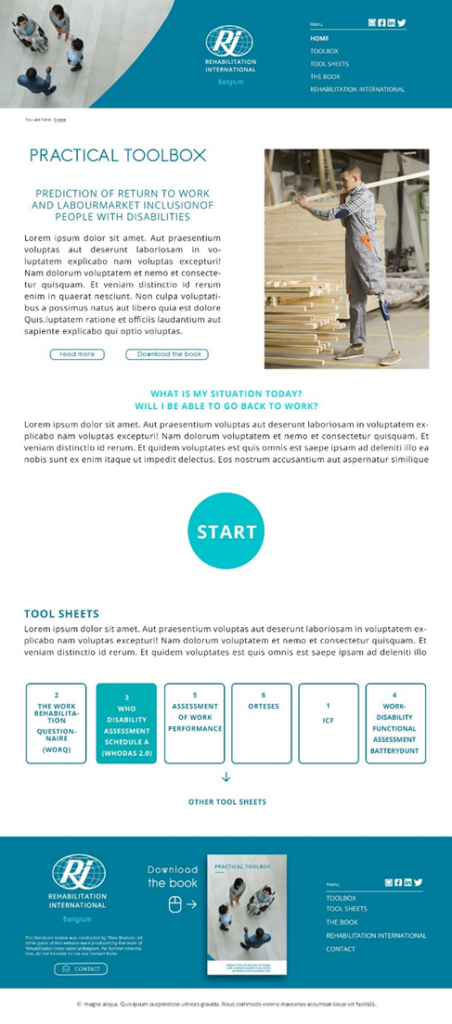
The first part of this guide is a reminder of the major Belgian and international issues surrounding the return to work of people with disabilities or those suffering from long-term disabling chronic diseases.
The second part focused the attention on assessments deemed useful in the return-to-work program. We also excluded assessments not available in English.
The third part is RI Belgium’s own questionnaire. It is a self-assessment questionnaire for people with disabilities or chronic illnesses to assist them in their return to work. It is not binding. Its sole objective is to situate them in relation to the resumption of a professional career. It can also serve as a basis for support by a return-to-work professional. The latter should, however, use scientifically validated tools in order to continue the process if the self-assessment questionnaire leads to the conclusion that a return to work is possible. RI Belgium recommends that return to work should always be voluntary and adapted to the individual medical and social situation of each person. In this area as in others, only approaches adapted to the situation can yield convincing results.
This is a user-friendly guide. That’s why we use straightforward language, understandable for most people, included people with disabilities. For the sake of simplicity, it is chosen only to present a resume of assessments, highlight the key points, and not compile a thorough report of their psychometric properties.
The only use of an assessment does not allow to understand health condition of the exact problem of the person with disability. We recommend putting the assessment into perspective with the ICF model. In this way, you can verify if all dimensions are to draw up a return-to-work plan. Medical and/or paramedical and/or social advice must be considered to draw conclusions about health conditions and work possibilities. Try to understand the interaction between health components. Cross reference objective data with subjective information. Don’t forget to consider the wish / perspective of people with disabilities. Each person is unique and works in a specific environment. The same diagnosis doesn’t mean the same functioning for two individuals. Consider the person with a disability as the most important expert of his disability and engage him in the procedure as far as practicable. A mixture of assessments can be useful in highlighting all barriers or facilities. Don’t forget that people assessment isn’t a waste of time but in fact really adds value in establishing a sustainable solution. Finally, we tried to include the reference by obtaining the questionnaire or contacting the authors. Most of them are in open access but others require a paid license to use them
“Mask for Prevention project – implemented by Child Welfare Scheme Nepal” – funded by the Rehabilitation International Global Disability Development Fund
The aim of the “Mask for Prevention” project is to produce and distribute masks, personal protective equipment’s (PPEs) and health items i.e., sanitizers, gloves, hand wash soaps, face shields, provide home based medicine services, supply emergency relief packages and counselling services to the students, teachers, health workers, children with disabilities, families of persons with disabilities, members of child clubs, self-help groups, mother groups, and COVID-19 infected and affected persons living in Pokhara Metropolitan City, Nepal to protect and prevent from COVID-19. This is a-6-month project started from July and ends at the end of December 2021.
During this project period, the following major activities were executed:
Production and distribution of masks: – CWSN made an agreement with a local manufacture to produce the quality and convenient Masks with the logos of RI and CWSN. A-total 4,30,500 (four hundred thirty thousand ad five hundred) masks were produced. CWSN started to distribution of masks from 24th November and completed on 15 December 2021. In total, 33,767 individuals were benefitted from the project. The total beneficiaries included 27,298 students and 1452 teachers from 35 schools (30 community and 5 disabled schools), 119 health workers from 22 urban health Centers, 375 individuals from 75 families of persons with disabilities, 2376 members from 96 child clubs, 1900 members from 196 mother groups, 196 members from 16 self-help groups, 41 persons with disabilities and 20 government staff from Education Department of Pokhara Metropolitan City.
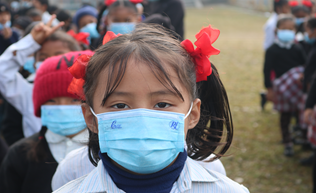
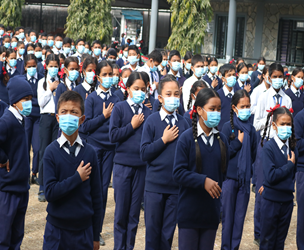
Distribution of PPEs and health materials: CWSN distributed PPEs and other health related materials i.e., sanitizers, gloves, hand wash soaps, face shields for 119 health workers from 22 Urban Health Centers of Pokhara Metropolitan City.
Sanitizer distribution: During the project period 416.8 liters sanitizer distributed including 275 liters for 35 schools, 110 liters for 22 UHCs, 22.8 liters for self-help groups, 9 liters for families of persons with disabilities.
Home based medicine services: during this reporting period, 41 persons with disabilities including children with disabilities have received home based medicine services. 10 out of 41, have also received dressing services, and a 9-year-old girl with Cerebral Palsy (CP) rescued and taken to the hospital for further treatment. This activity has been carrying out from July to December 2021.
Emergency relief/food packages distribution: CWSN distributed emergency relief packages for the 375 individuals from 75 families of persons with disabilities. These packages were included rice, lentils, oil, spices, soyabean chunks, dry beans, salt, soaps, washing powder, pad and diaper. This distribution program carried out during the lock down from the 20th to 26th August 2021.
Counselling service: CWSN mobilized its two Psychosocial Counselors to provide counselling services for the persons with disabilities, mother groups, child clubs members, and self-help group’s members on COVID-19 impact during and post covid period. CWSN started counselling services form July and till the reporting period, a total 548 individuals were benefited from this service.


